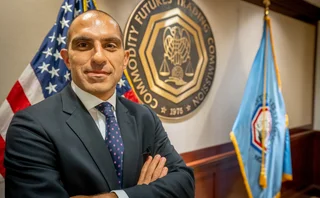
US Congress demands answers on SARs
Defensive filers and FinCEN in GAO probe
US Congressmen have asked the Government Accountability Office (GAO) to investigate the mission and operational capacity of the Financial Crimes Enforcement Network (FinCEN), and the increasing volume of Suspicious Activity Reports (SAR) that the agency is receiving.
In a letter to David Walker, Comptroller General of the United States, the heads of the House Committee on Financial Services expressed concern over “the mission and operational capacity of FinCEN”, in light of a hearing in May by the Subcommittee on Oversight and Investigations that “raised questions about the efficiency and effectiveness of Bank Secrecy Act (BSA) administration and enforcement”.
The letter, co-signed by House of Representatives members Barney Frank and Spencer Bachus, also expressed concerns over the number of SARs filed and specifically that at the May hearing, “a number of banking industry witnesses commented that they lacked clear guidance on what law enforcement is looking for and finds useful in these reports.”
Witnesses also “noted that the industry engages in ‘defensive’ SAR filings or errs on the side of filing a SAR even if there is doubt about its usefulness, in order to avoid the possibility of being penalised by federal financial institution regulators”.
The letter goes on to lay out a number of specific questions the House Committee wants answered, to ascertain the severity of the situation and FinCEN’s capability to respond.
Defensive SAR filing is a serious problem. In 2006 alone, more than a million SARs were filed with FinCEN, in addition to 15 million currency transaction reports received over the same period. The overwhelming number of reports flooding the agency has raised serious and legitimate concerns over whether FinCEN is equipped to deal with the workload, and how to cut down on unnecessary filing.
The letter coincides with the release of a statement from the US financial regulators setting forth their policy for enforcing specific anti-money laundering requirements of the BSA, and clarifying their intent to hand cease-and-desist orders to institutions that fail to comply with money laundering rules.
The investigative process, both in Congress and at the GAO, will be conducted through in a series of reports, briefings or testimonies over the next two years.
Only users who have a paid subscription or are part of a corporate subscription are able to print or copy content.
To access these options, along with all other subscription benefits, please contact info@risk.net or view our subscription options here: http://subscriptions.risk.net/subscribe
You are currently unable to print this content. Please contact info@risk.net to find out more.
You are currently unable to copy this content. Please contact info@risk.net to find out more.
Copyright Infopro Digital Limited. All rights reserved.
You may share this content using our article tools. Printing this content is for the sole use of the Authorised User (named subscriber), as outlined in our terms and conditions - https://www.infopro-insight.com/terms-conditions/insight-subscriptions/
If you would like to purchase additional rights please email info@risk.net
Copyright Infopro Digital Limited. All rights reserved.
You may share this content using our article tools. Copying this content is for the sole use of the Authorised User (named subscriber), as outlined in our terms and conditions - https://www.infopro-insight.com/terms-conditions/insight-subscriptions/
If you would like to purchase additional rights please email info@risk.net
More on Regulation
Prop shops recoil from EU’s ‘ill-fitting’ capital regime
Large proprietary trading firms complain they are subject to hand-me-down rules originally designed for banks
Revealed: the three EU banks applying for IMA approval
BNP Paribas, Deutsche Bank and Intesa Sanpaolo ask ECB to use internal models for FRTB
FCA presses UK non-banks to put their affairs in order
Greater scrutiny of wind-down plans by regulator could alter capital and liquidity requirements
Industry calls for major rethink of Basel III rules
Isda AGM: Divergence on implementation suggests rules could be flawed, bankers say
Saudi Arabia poised to become clean netting jurisdiction
Isda AGM: Netting regulation awaiting final approvals from regulators
Japanese megabanks shun internal models as FRTB bites
Isda AGM: All in-scope banks opt for standardised approach to market risk; Nomura eyes IMA in 2025
CFTC chair backs easing of G-Sib surcharge in Basel endgame
Isda AGM: Fed’s proposed surcharge changes could hike client clearing cost by 80%
UK investment firms feeling the heat on prudential rules
Signs firms are falling behind FCA’s expectations on wind-down and liquidity risk management







